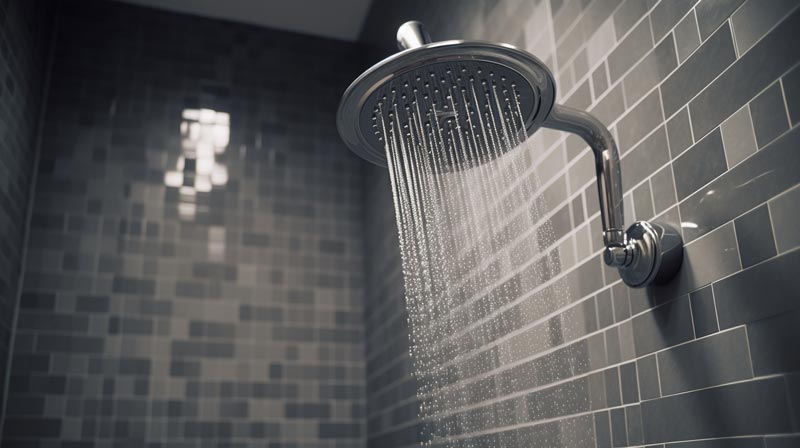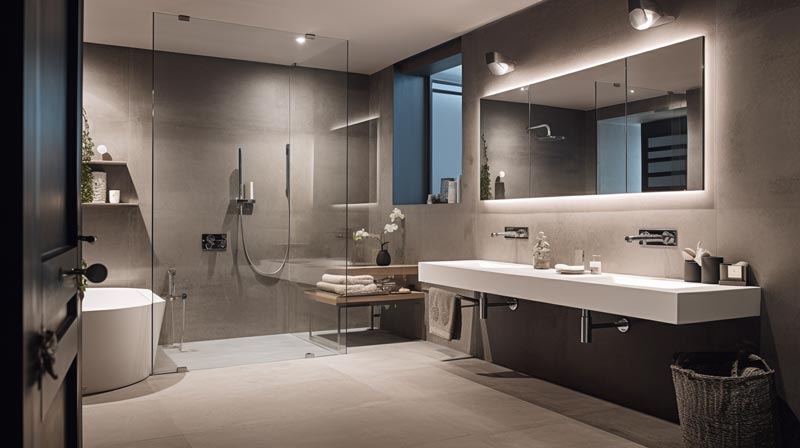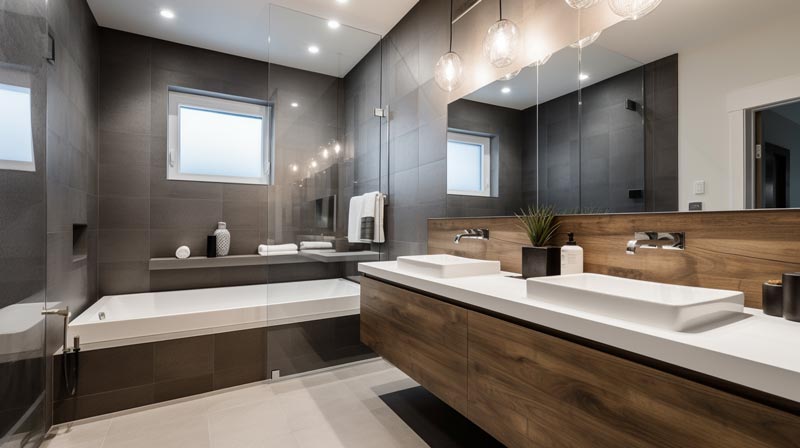- Free Estimates

Are you planning a bathroom remodeling in Charlotte, NC? If so, one crucial aspect you should consider is waterproofing your shower. A well-waterproofed shower can save you from costly repairs in the future and make your bathroom more functional and visually appealing. This blog will discuss the best products, techniques, and practices for waterproofing your shower. We’ll also mention the importance of hiring a professional shower remodeler like Shower Remodel Experts Charlotte for your project. So, let’s dive in and explore!
When it comes to waterproofing your shower, you have several options to choose from. Here are some of the popular ones:
Waterproofing membranes are thin, flexible sheets that you can apply over the surface of your shower to prevent water penetration. There are two main types of waterproofing membranes: sheet and liquid. Sheet membranes are self-adhesive, whereas liquid membranes are applied with a roller or brush. The advantage of using membranes is that they provide a seamless and continuous protection against water.
Waterproofing paint is another option for waterproofing your shower. It’s a special paint type containing a waterproofing agent, such as latex or epoxy. You can apply it directly over the surface of your shower. The benefit of using waterproofing paint is that it’s easy to apply and dries quickly.
Waterproofing sealants are products you can apply over the joints and gaps in your shower to prevent water from seeping in. Different types of waterproofing sealants exist, such as silicone, polyurethane, and acrylic. The advantage of using sealants is that they’re flexible and can withstand movement and vibration.

To ensure proper shower waterproofing, you need to follow the right techniques. Here are the steps you should take for a successful bathroom remodeling in Charlotte, NC:
Before applying any waterproofing product, you must prepare your shower’s surface. Start by thoroughly cleaning the surface with soap and water to remove dirt, grime, or soap scum. Next, remove any old caulk and grout from the joints and gaps in your shower. Finally, make sure the surface is completely dry before proceeding to the next step.
Before applying the waterproofing membrane, paint, or sealant, consider applying a waterproofing primer. A primer helps the product adhere better to the surface, making it more effective. It also helps fill any cracks or gaps in the surface, preventing water from seeping through.
The next step is to apply the waterproofing product. Follow the manufacturer’s instructions carefully to ensure proper application. Use a roller or brush to apply liquid membranes or paint. For sheet membranes, peel off the backing and apply the membrane over the surface of your shower. Use a caulk gun to apply the product over the joints and gaps in your shower for sealants.
In addition to using the primary waterproofing product, consider adding a secondary layer of protection. For instance, you can install a waterproofing system behind the surface, such as a vapor barrier or waterproofing backer board. This provides an extra layer of protection and ensures your shower stays waterproof even in extreme conditions.
You must check the product’s thickness and consistency to ensure proper coverage. Follow the manufacturer’s guidelines to determine how much product you need to apply. Use a brush or roller to spread the product evenly over the surface of your shower. Pay attention to the joints and gaps and ensure the product covers them completely.
To ensure long-lasting and effective waterproofing, you should follow these best practices:
Always follow the manufacturer’s instructions when using any waterproofing product. This will ensure that you apply the product correctly and get the best results. Failure to follow the instructions can lead to inadequate waterproofing and costly repairs.
Choosing the right product is crucial for effective waterproofing. Consider factors such as the type of surface, the level of water exposure, and the cost. Consult a professional in bathroom remodeling in Charlotte, NC, like Shower Remodel Experts Charlotte, to help you choose the best product.
Proper ventilation is crucial for preventing moisture buildup in your shower. Without adequate ventilation, the humidity in your bathroom can increase, leading to mold and mildew growth. Ensure your shower has a ventilation fan to remove moisture from the air. Also, keep the bathroom door open after showering to allow the humidity to escape.
While DIY waterproofing may seem like a cost-effective option, it’s essential to consider the benefits of hiring a professional in bathroom remodeling in Charlotte, NC. A professional has the expertise and experience to ensure your shower is waterproofed correctly. They can also recommend the best products and techniques for your needs, saving you time and money in the long run. Plus, they offer warranties and guarantees, giving you peace of mind knowing that your shower is protected.
Even with proper waterproofing, your shower can still develop leaks over time. Therefore, it’s essential to perform regular maintenance to ensure your shower stays waterproof. Here are some tips:

When waterproofing your shower, there are several mistakes you should avoid. Here are some of the common ones:
One of the biggest mistakes people make when waterproofing their shower is skipping surface preparation. If you don’t clean the surface and remove old caulk and grout, the waterproofing product won’t adhere properly, leading to inadequate protection.
Using the wrong product can also lead to inadequate waterproofing. For instance, using a paint product not specifically designed for waterproofing won’t provide the necessary protection against water.
Another mistake is not applying enough products. If you don’t apply the product thick enough or cover all the joints and gaps in your shower, water can still seep through, causing damage.
Finally, not allowing the product to dry properly is a common mistake. Using your shower before the product has had enough time to dry can compromise the waterproofing and lead to water damage.
By avoiding these common mistakes and following the best practices and techniques for bathroom remodeling in Charlotte, NC, you can ensure your shower stays waterproof and protected for years.
Waterproofing your shower is crucial to any bathroom remodeling in Charlotte, NC. By using the right products and techniques, you can prevent costly repairs in the future and make your bathroom more functional and visually appealing. Remember to follow best practices such as following the manufacturer’s instructions, choosing the right product, and performing regular maintenance.
If you need help with your shower remodel project, contact Shower Remodel Experts Charlotte. Their team of professionals has the expertise and experience to ensure your shower is waterproof and functional. Don’t hesitate to give them a call today!
4425 Sharon Rd Suite 405, Charlotte, NC
28211, United States
Copyright © 2023 Shower Remodel Experts Charlotte